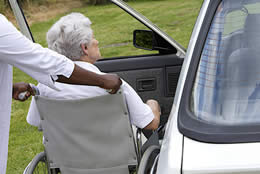 Driving is a privilege and an important aspect of independent living. Owning or having access to a vehicle gives people the opportunity to go to work, buy groceries and other necessities, and visit family and friends. While many people take driving for granted, it’s a task that’s anything but routine. Safe driving requires fast reflexes, clear vision, sound judgment, and a good memory.
Driving is a privilege and an important aspect of independent living. Owning or having access to a vehicle gives people the opportunity to go to work, buy groceries and other necessities, and visit family and friends. While many people take driving for granted, it’s a task that’s anything but routine. Safe driving requires fast reflexes, clear vision, sound judgment, and a good memory.
Unfortunately, those traits are among some of the most profound losses that adults experience as they age. The Centers for Disease Control and Prevention says that there were 40 million licensed older drivers in the U.S. in 2015—a 50-percent increase from 1999. In addition, the agency also says that more than 5,700 elderly adults were killed and 236,000 injured in auto accidents in 2014.
Because the risk of being injured or killed in a car accident increases with age, it’s vital to discuss the issue with your aging parents and help them understand the dangers they face when they get behind the wheel.
Tips for Discussing Driving with Your Parent
It’s important to honestly and objectively evaluate your parent’s driving skills as he or she ages.
You should also remember that age alone isn’t always a reliable indicator for a person’s driving ability, as some people retain the traits needed to drive safely for many years, while others may experience a decline in driving skills at a relatively young age. Warning signs to watch for in seniors and older adults include things like frequent accidents, traffic citations, unexplained vehicle damage, or getting lost while driving in familiar areas.
If you suspect that your parent should not be driving and that he or she could be a danger to himself/herself or others on the road, you should discuss the issue immediately. Following these tips can help make the discussion productive and less likely to result in conflict:
- Initiate a conversation about his or her driving. Some seniors may already know that their driving could be dangerous, but they may be reluctant to stop due to fear of burdening others. Starting a conversation can help you learn about how your parent feels about his or her own driving.
- Enlist the help of a healthcare professional or peer. Whether it’s your parent’s physician, eye doctor, or trusted friend, seniors can be more likely to be receptive to alternative arrangements for getting around town if they get a second opinion on their driving abilities. It’s especially important to get the support of your parent’s doctor if he or she is suffering with dementia or Alzheimer’s, which can significantly increase the chances of car accidents.
- Look for alternative arrangements. Seniors who stop driving don’t have to rely exclusively on family and friends to get around. They can maintain their independence by utilizing a variety of transportation services for things like doctor appointments, daily errands, trips to the grocery store, and more.
Having a plan in mind before you initiate a potentially difficult conversation can go a long way when it comes to helping your senior parent understand the dangers he or she faces on the roadway.
Seniors Helping Seniors® In Home Care is South Florida’s Choice for Transportation Services
At Seniors Helping Seniors, we know that discussions about driving are always difficult for adult children and their aging parents. If you need help navigating this complex and often emotional issue, we’re here to assist. And should the need arise, our services include driving our clients to a variety of errands and appointments. Call (954) 202-5200 or complete our online form for more information.


